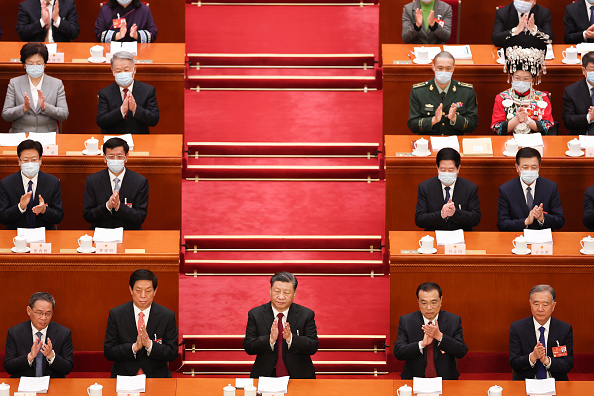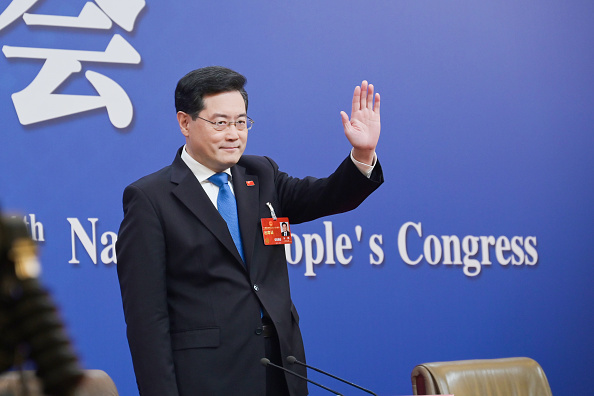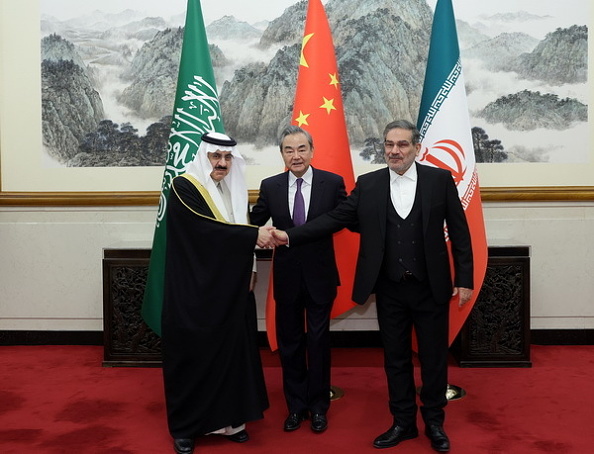
 Party Time
Party TimeXi Jinping solidified his status as China's most powerful leader since 1949 by starting a third term as president, with unanimous approval from the National People's Congress. He received 2,952 votes followed by a standing ovation in a ceremony designed to showcase unity and loyalty to the Party. Xi assumes this unprecedented role against a backdrop of economic uncertainty and rising tensions with the U.S. and other powers.
The endorsement of Xi's appointment formalized his continued strength in Chinese politics after he had already been approved for a fresh term as party leader in October. He will continue to oversee the party, military, and state apparatus of the nation.
During the annual "two sessions," Xi stressed the need to improve China's "integrated strategic capabilities" to fulfill China's goal of national rejuvenation and build a world-class army. Just days after his foreign minister warned of the growing possibility of conflict with the U.S., Xi called for "more quickly elevating the armed forces to world-class standards."
"[Whether we can] implement this policy well … has profound significance in our building of a modern socialist country, pushing forward our dream of national rejuvenation … and accelerating the modernization of our army as a world-class armed force," Xi said.
The other major message emanating from Beijing's halls of power is that China is back on the international stage after a brief COVID-setback. China will increase its defense budget by 7.2%, and the national growth target by 5% for 2023. The budget for diplomatic expenditure, which covers the Foreign Ministry, Chinese embassies and consulates, China's participation in international organizations, foreign aid, and external propaganda, will be increased by 12.2%, a sign that China is bouncing back from its isolation and resuming international outreach.
The "two sessions" meetings also indicated a hardened stance against the U.S. and other powers, as well as a focus on reversing the domestic economic slowdown. Xi suggested that Western powers were to blame for China's economic woes, calling out the United States in a rare move of directly criticizing the U.S. in a major speech.
"[In the past five years,] Western countries led by the United States have contained and suppressed us in an all-round way, which has brought unprecedented severe challenges to our development," Xi told a group of government advisers.
Learn more in "Domestic Concerns are Shaping Beijing and Washington," an interview with Wang Jisi, a professor at Peking University.
 Heated Rhetoric
Heated RhetoricEchoing the strong rhetoric of Xi Jinping, China's foreign minister Qin Gang took aim at the United States during his first press conference as foreign minister, on issues ranging from the Ukraine-Russia conflict to the role America plays in international relations. He pointedly called out the "invisible hand" pushing to escalate the crisis in Ukraine, saying China has not supplied weapons to Russia and calling the Beijing-Moscow relationship "a good example for international relations."
Qin said China-U.S. relations have "seriously deviated" and warned that "containment and suppression will not make America great. It will not stop the rejuvenation of China."
The foreign minister also noted that the U.S. says it is establishing protective barriers to ensure there is no conflict with China, while simultaneously expecting that Beijing not respond with words or actions when slandered or attacked.
"If the U.S. side does not put on the brakes and continues down the wrong path, no amount of guardrails can stop the derailment and rollover into confrontation and conflict," Qin said.
In recent months, the U.S. has cracked down on China's semiconductor industry, and deepened its alliances in Asia in a bid to counter Chinese influence in the region.
Meanwhile, in Washington the Homeland Security subcommittee on counterterrorism, law enforcement and intelligence held a hearing focused on the threats that Chinese encroachment presents to the U.S. Representative August Pfluger (R-TX) called the recent Chinese balloon "a brazen display of espionage in the U.S. homeland" and "one of many ways the CCP is working to exploit our vulnerabilities." And at the annual U.S. Senate Intelligence Committee, Director of National Intelligence Avril Haines called China the "most serious political rival" for the United States.
Learn more in "Communication is Key," an interview with Craig Allen, President of The U.S.-China Business Council.
 Diplomatic Breakthrough
Diplomatic BreakthroughIran and Saudi Arabia have agreed to mend diplomatic ties after a series of negotiations moderated by China, ending a long-standing feud of almost seven years between the two regional rivals. A joint statement issued by Iran, Saudi Arabia, and China states that the two countries have agreed to resume diplomatic relations within two months and reopen embassies and agencies in both countries. The announcement was made following a meeting between China's senior diplomat Wang Yi and representatives from the two countries in Beijing on Friday.
As part of the agreement, Riyadh and Tehran have agreed to host meetings between respective foreign ministers and explore steps to enhance bilateral relations. The two countries have also agreed to reactivate security cooperation deals signed in 2001 and cooperation agreements from 1998 on various sectors such as economy, trade, culture, and more. Additionally, both nations agreed to affirm "the respect for the sovereignty of states and the non-interference in internal affairs of states."
The breakthrough has been hailed as positive news for the region, and identified as a sign that there has been enough dialogue "to start some serious confidence-building measures and agree to this roadmap to restore full diplomatic relations."
Experts have called this a diplomatic win for China, particularly in a region where the United States has had a stronger geopolitical presence. And the move comes as the Biden administration tries to notch its own win in the Middle East by trying to broker a normalization pact between Israel and Saudi Arabia.
China's foreign minister Wang Yi said that the dialogue in Beijing had opened a new chapter in relations between Saudi Arabia and Iran. He also said that this agreement was "...a victory for dialogue, a victory for peace, offering major good news at a time of much turbulence in the world."
Wang also stated that "as a good-faith and reliable mediator, China has faithfully fulfilled its duties as the host," and that China will continue to play a constructive role in handling hotspot issues in the world and demonstrate its responsibility as a major nation.
Read more in "Xi's Visit to Saudi Arabia Pressures the United States to Reevaluate its Relationship," by James Hinote, an independent analyst.
Prepared by China-US Focus editorial teams in Hong Kong and New York, this weekly newsletter offers you snap shots of latest trends and developments emerging from China every week, while adding a dose of historical perspective.
- 2023-03-03 “An Existential Struggle”
- 2023-02-24 Opposing Worldviews
- 2023-02-17 Ripple Effects
- 2023-02-10 Ballooning Tensions
- 2023-02-03 Hot Air
- 2023-01-27 Spheres of Influence
- 2023-01-20 China's Davos Pitch
- 2023-01-13 Strategic Encounters
- 2023-01-06 Common Challenges
- 2022-12-23
- 2022-12-16 All in On Africa
- 2022-12-09 Seeking Stabilization
- 2022-12-02 Turf Tension
- 2022-11-18 Thawing Ties?
- 2022-11-11 Face to Face
- 2022-11-04 The Pacing Challenge
- 2022-10-28 Third Time’s the Charm
- 2022-10-21 United as Steel
- 2022-10-14 Party Time
